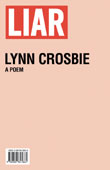
I have just finished reading poet, novelist and cultural critic Lynn Crosbie's book-length poem Liar (Anansi, 2006, $18.95 Cdn.). Like all of her work, Liar is superb, although -- like almost all of her other work -- it left me feeling splayed and gutted. Liar is more than a confessional work: it is the emotional autopsy of a relationship ruptured by deceit.
Liar is described inaccurately on its back cover as "a testament to love found, betrayed, renounced, and ultimately accepted." One reviewer comments irrelevantly (or at least incompletely), "It matters, of course, that the man in the relationship [editor and poet Michael Holmes, who is not named in Liar] ... lied and cheated, then lied and cheated again." Another reviewer compares Crosbie, inexplicably, to Evelyn Lau, surely Canada's literary high priestess of infidelity. None of these descriptions comes at all close to articulating the searing revelations Liar makes, the power of its confession.
Liar is not about any individual lie, nor even the piled collection of lies the poem amasses like ropy intestines or a twisted knot of snakes. It is about the truth, painfully and unwillingly exposed. It is about the admission that a lie is meaningless unless there is someone present to believe it, to engage in the kind of visceral self-delusion -- the greatest lie -- that harnesses all truths to serve it and produces the most impenetrable blindness. And it is not this blindness that hurts, but the ripping off of the blindfold. Crosbie writes,
the moon rises like a flush of burning metal, exposing the distanceThe truth sheds a harsh light on all it touches. The truth Liar asserts is corporeal, excoriating, even cringing. But visceral truth -- especially when no other truth is possible -- is cathartic. Like the opening and purging of a wound, it is the necessary prelude to healing. Crosbie's readers would do well to recognise this flinching gift: the ability to self-dissect is one of Crosbie's many admirable strengths as a writer.
between what I know to be true
and my desperation to desert it.
Years ago I loved a man who did not love me, but who relied upon my willingness to prostrate myself in service. After the relationship ended, I was surprised at the depth of my contempt. I was able to pretend only for a short time that all of my contempt was for him; soon I realized that much of it was self-directed. For all his omissions, I was guilty of the greater lapse of self-delusion. At the time I wrote,
an analysis of the relationship shows him to have been incredibly callow about it, and also shows me to have been incredibly blind and weak. ... He didn't know how to deal with the limitations he wanted to impose, and I didn't know how to recognise them. So now he is huddled in his dank apartment in his worn clothes, eating stale food prepared without care, working at his decrepit computer on his thesis, going to sleep on the floor surrounded by books piled against the walls because he doesn't have bookcases for them. And I am sitting crying in my apartment because I would have given everything to be able to share that life.Some time later, after another relationship ended, I wrote, "I have a visceral desire to tell you about the grief I suffered, which seemed not so much about you exactly, but was rather about the things I had lost." Similarly, Crosbie writes,
I do not want you back, but my life, your part in its unspoken promises --What was undone. Not the relationship itself, but the life its lies ruptured and reduced to entrails, bottled and preserved for the appearance of solidity, then spilled in further breakage. In the end Crosbie writes of "how I have been suspended, deformed myself, in love with you", returning to her opening image of pickles,
I want that, what was undone, what was never made.
diminished and ghastly green, swayingThere is a valuable instruction here. And Liar should endure, not for the darkly voyeuristic pleasures it admittedly offers, nor even primarily for its lyrical strength and its sustained argument, but for the visceral truths it exposes, truths that -- even (or particularly) if scarred -- will outlive any lie.
in some awful memory of what it is to be possessed of one's self, entirely.
Perhaps not unlike Crosbie, I was alone for a long time. I lived alone until I was again possessed of myself, entirely. I did so until I encountered another who would withstand the searing judgement of my gaze, because he had also prostrated himself in willing service, offered himself up as food, before remembering what it was like to be possessed of himself, entirely.
1 comment:
This isn't love you're writing about. It's anything but. Love is boundless joy and endless peace and an unconditional, unhesitating YES. What you're writing about is what rushes in to fill the void when Love is absent. Love never lies, never leaves, and never ends. I have known that thing you wrote about, and I now know Love, and I tell you, the two are not the same.
Post a Comment